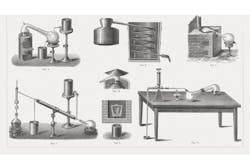Productivity perspectives: Take a long-term approach, though time is short
Someone sent the magazine a survey the other day, which got us thinking.
In the next several years, the largest changes in the chemical industries will likely follow, as a near-dependent variable, from the global vagaries of oil and natural gas markets. That’s been mostly good for the United States recently, although the most salient characteristic of the oil & gas industries is volatility, already evident to some extent, for example, in Samson Resources planned Chapter 11 filing. Boom and bust makes some rich, while hurting most.
To stop and think, though, about where these industries will be in 100 years, is equally thought-provoking. Would it be possible to continually increase the benefits that chemical engineering brings to modern life on so many levels, while preserving the market-based competition that serves us so well in terms of efficiency and, simultaneously, bring to bear a unified science that optimizes entire eco-systems? Are urban and education challenges part of this?
Understandably skeptical
A century ago, men and women living on the south side of Chicago walked to work at the Sherwin Williams plant.
Unfortunately, it’s not difficult to see why so many are skeptical that these holistic solutions can possibly work. Even present experience shows that to the extent governmental entities become involved, their priorities, and not those of either productivity or sustainability, or even of the people involved, are uppermost in the minds of decision makers. A quick look at the oil & gas industry in Mexico or Brazil will convince anyone of that.
Como no?
A spate of articles has appeared in the press recently questioning why productivity statistics the last several years have shown so little gain. After all, one researcher said, using computer systems has made everything so much easier.
That’s not really true. Go into any grocery or department store. Go and get your oil changed. The simplest transactions take 10 minutes of options and overrides. The computers are a higher priority than the customer.
It’s not clear to what extent this analogy fits the process industries. But clearly an installed base of equipment from multiple previous technology generations brings challenges to realizing the promise of data analytics.
For Processing magazine, the story is incremental innovation in equipment and instrumentation markets, but we hope that the world will make best use of the wonders of chemical engineering, and even as a means to better stabilize an increasingly unstable world.
